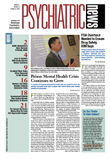Factors associated with remission from primary psychosis appear to be also associated with remission from substance-induced psychosis.
Those factors include better premorbid adjustment, shorter duration of untreated psychosis, better insight into psychotic symptoms, and lower severity of psychotic symptoms, according to a report in the October Schizophrenia Bulletin.
Lead author Carol Caton, Ph.D., told Psychiatric News that the similarity in factors associated with remission suggest some underlying neurobiological similarity between primary psychosis and substance-induced psychosis.
“The predictors for remission in both diagnostic groups were the same,” she said. “That hadn't been documented before. What it suggests is that whatever the biological mechanism is that causes people to become psychotic, there must be some similarity whether the psychosis is primary or substance induced.”
She is a professor of clinical public health for psychiatry and sociomedical science at the Columbia University College of Physicians and Surgeons and director of the Columbia Center for Homelessness Prevention Studies.
In the study, funded by the National Institute on Drug Abuse, Caton and colleagues examined rates and predictors of psychosis remission at one-year follow-up for 319 patients with a history of recent substance use who were admitted to the emergency department with psychotic symptoms of recent onset. Of these, 133 had substance-induced psychosis and 186 had primary psychosis.
The diagnostic distinction between a primary psychotic disorder and a psychotic disorder that is substance induced was made using the Psychiatric Research Interview for Substance and Mental Disorders, an interviewer-administered research diagnostic instrument developed to assess psychiatric and substance use comorbidity using DSM-IV criteria.
“This gave us a sample of people who were both psychotic and substance users and allowed us to look at the differences in remission rates and predictors for remission between those with primary psychosis and those with substance-induced psychosis,” she said.
At one-year follow-up, 50 percent of patients with primary psychosis were in remission, compared with 77 percent of patients with substance-induced psychosis. Premorbid adjustment was assessed using the Positive and Negative Syndrome Scale.
Caton told Psychiatric News that the higher rate of remission for substance-induced psychosis was not surprising. But she noted that 23 percent of those patients had not remitted and continued to be symptomatic, evidence of the potentially chronic nature of a substance-induced psychosis.
“It underscores the importance of getting people into treatment,” she said. “There is a clinical lore that substance-induced psychosis is not as serious, but without effective treatment these people can develop a persistent psychotic disorder. It is not a benign condition.
“We think aggressive, assertive treatment is needed,” she said.“ That hasn't been a widespread practice. If people are seen in a psych [emergency department], and their symptoms remit in a day or two with a drug-free period, they are sometimes released with a referral to a treatment center. But that doesn't mean the patient follows the referral. We think there should be more assertive ways to make certain that people get treated.”
Caton said that among patients with substance-induced psychosis, the most common substances involved were, in rank order, cannabis, alcohol, cocaine, and hallucinogens. A smaller percentage of patients used heroin or other substances.
The same rank order of substances was found for individuals with primary psychosis.
In 39.6 percent of the substance-induced psychoses, two or more substances were used, with cannabis and alcohol the most common combination, followed by alcohol and cocaine, Caton told Psychiatric News.
In the Schizophrenia Bulletin report, Caton and colleagues stated that the “stress-diathesis model suggests that substance abuse may precipitate psychosis among some people who would otherwise be vulnerable but notpsychotic.” And they cited research showing that individuals who are vulnerable to psychosis because of a specific polymorphism of the catechol-O-methyltransferase gene increase their vulnerability if they are heavy cannabis users in adolescence.
A second possibility is that psychosis may emerge earlier in substance-using vulnerable individuals who would otherwise develop the illness later, they suggested.
“This sets the stage for neuroscience to take over and explore the underlying causes of substance-induced psychosis,” Caton told Psychiatric News.
